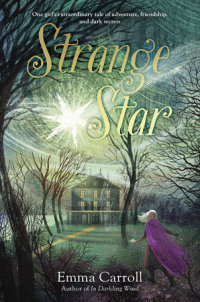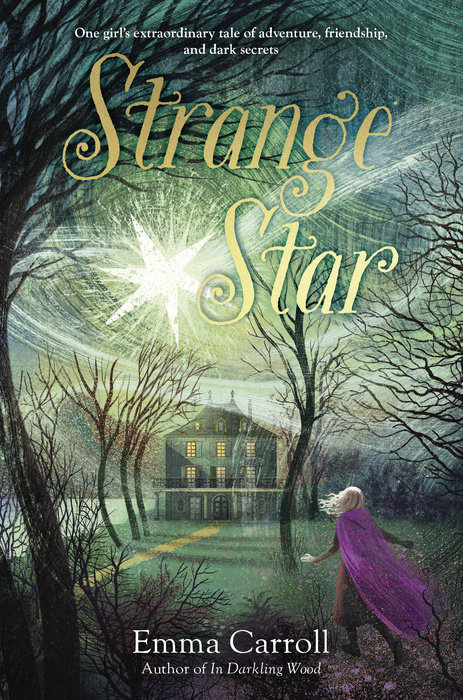Strange Star
From the critically acclaimed author of In Darkling Wood comes a spine-tingling novel inspired by Frankenstein with more than a hint of mystery and suspense.
One stormy June evening, five friends meet at Villa Diodati, the summer home of Lord Byron. After dinner is served, they challenge each other to tell ghost stories that will freeze the blood. But one of the guests--Mary Shelley--is stuck for a story to share.
Then there's an unexpected knock at the front door. Collapsed on the doorstep is a girl with strange scars on her face. She has traveled a long way with her own tale to tell, and now they all must listen.
Hers is no ordinary ghost story, though. What starts as a simple tale of village life soon turns to tragedy and the darkest, most dangerous of secrets. Sometimes the truth is far more terrifying than fiction . . . and the consequences are even more devastating.
Praise for Emma Carroll's In Darkling Wood:
"A haunting and poignant exploration of family, loss, and redemption." --Booklist, Starred
"A tale brimming with emotion and atmosphere. . . . [In Darkling Wood] is absorbing and well written. Hand this to readers who enjoy fantasy, fairy tales, and magical realism."--School Library Journal, Starred
"Magic and mystery adds appeal to this already compelling family drama...and Carroll manages to wrap all of the threads into a wholly satisfying ending."--Bulletin
An Excerpt fromStrange Star
Chapter 1
It was felix’s job to deliver the invitation. On such a sparkling, sunny morning after weeks of cold rain he was glad to be outside, stretching his legs. Not that he had far to go--Mr. and Mrs. Shelley’s villa was just a short walk through the apple orchard. He’d be back at Diodati again in less than twenty minutes, the job done.
Yet this wasn’t just any job. Or any invitation. And despite knowing it was a servant’s responsibility to deliver messages, not read them, Felix couldn’t resist glancing at the card in his hand. Lord Byron’s words, in still-wet ink, read more like a challenge than an invitation. Felix prickled with excitement.
Tonight was going to be spectacular.
Once through the orchard, Felix raced up the steep steps to the Shelleys’ front door. His master, Lord Byron, had known Mr. and Mrs. Shelley and Miss Clairmont back in London, where he lived most of the year. Like him, they were writers. Free thinkers--at least, the Shelleys were. Mr. Shelley, a poet, was tall and sickly thin. Mrs. Shelley, smaller, quieter, had the fiercest eyes Felix had ever seen. And Miss Clairmont, stepsister to Mrs. Shelley, was a whirlwind of emotions who cried as much as she laughed. Like Byron, the little group had come here to Switzerland for the summer to take in the mountain air. As individuals, they were interesting enough, but together, their sparks became flames.
At the top of the steps, Felix noticed the shutters at the Shelleys’ windows were still closed. It was too early for them to be awake. They’d stayed late at Diodati last night, when, even then, the talk had been strange. They’d spoken of experiments done on corpses. Of a dead frog made to twitch as if alive. It was all Felix could do to trim the candles slowly and pour coffee drip by drip, just to stay in the parlor and listen.
So when he knocked on the front door with a rat-tat-tat he didn’t expect anyone to answer; the noise simply echoed down the long, empty hallway. The Shelleys didn’t care for rules, Lord Byron said. In which case, Felix hoped they wouldn’t mind an invitation slipped under the door instead of being delivered safely into their housemaid’s hand.
As Felix turned to go he caught a glint of sun on glass. Not every shutter was closed after all. At a small window near the top of the house, someone was watching him. Felix shielded his eyes to get a better look. The person staring down was a child--a girl of about ten--with curls of white-blond hair. Someone--Frau Moritz, probably--had mentioned that the Shelleys had adopted the girl on their travels.
Smiling, Felix raised his hand to wave. “Hullo!” he mouthed.
The girl stared, her eyes as wide as soup plates. Slowly, tentatively, she waved back, though she didn’t return his smile.
At the Villa Diodati, Frau Moritz, the housekeeper, was standing on the kitchen steps. The sight of her there, hands on generous hips, made Felix’s spirits sink because he knew she was waiting for him. Since Lord Byron’s announcement at breakfast of his plans for tonight’s gathering, she’d been in a terrible spin. And the person who bore the brunt of it, as ever, was Felix.
“You took your time,” she observed.
Frau Moritz liked her household to run as smoothly and precisely as a Swiss clock. Everyone had their place, did their proper work. Even on the outside, the Villa Diodati had that same air of routine. It was a big, square, imposing house with shuttered windows and steep gardens lined with cypress trees. If a house could sit sensibly then Diodati did so in its place on the hillside above the lake named Geneva, after the nearby town. It struck Felix as slightly odd that Lord Byron, with his wild reputation, should spend his summer at such an orderly house. Yet he was a man of many sides, as Felix was quickly learning.
“No more dallying,” Frau Moritz said. “We need wood brought in for the fires. Quickly now, my boy.”
Nodding, Felix pressed his lips shut. He wasn’t her boy. Nor was he anyone else’s. Those days were disappearing fast, when the color of a person’s skin gave them rights over others, his master told him. Apparently, it was the fashion in England for gentlemen to have a black footman. And it was good work too, with smart uniforms and decent pay and a chance to mix with society’s finest, which wasn’t a thing Felix had thought possible before now.
Frau Moritz had hired him from the marketplace in Geneva, where she’d found him amongst the salamis and pickled vegetables, looking dazed. He’d traveled months and many long miles from America to the French coast, and when his ship docked at Calais, he rode the first cart heading south. He’d never meant to end up somewhere so cold. Frau Moritz’s offer of work wasn’t charity as such. True, he was skinny and filthy and desperate for a job; truer still was her keen eye for a bargain, since no one round here would pay much for a black servant.
Then Lord Byron arrived for the summer months. He brought with him his doctor, John Polidori, and soon afterwards the Shelleys and Miss Clairmont took lease of the villa next door. Felix had never met people like them. They opened his eyes to a world of possibilities. He began to hope for better. Most of all, he dreamed of his master taking him back to London in the autumn as his footman. And so he set himself a mission this summer, to prove himself worthy of the role.
With his log basket now filled, Felix headed back inside. Climbing the kitchen steps, he felt a sudden twinge in the scar just above his left wrist. The scar was shaped like a ragged letter S. Mostly, he kept it hidden under his shirtsleeve in case of questions. Not that he’d run away from America; he’d sailed to Europe a free person and he’d worked hard for that freedom, too.
Yet feeling the twinge stopped him in his tracks. He blinked up at the sky. Pain like this meant a storm was on its way, though currently the morning was still fine. Even the comet that had hung over them these last months was fading so fast it looked no more than a wisp of smoke. From the west a bank of cloud was blooming. The smell of rain was already in the air. Felix shuddered with delight. With a storm as the backdrop, he could only imagine how incredible tonight’s ghost stories would sound!
Inside at the kitchen table Frau Moritz’s daughter, Agatha, was peeling potatoes. She pretended to ignore Felix; her bowed head with its thick brown plait of hair pinned from ear to ear was all he saw. Still, he felt her eyes slide over him.
“Will you tell him, Mama, or shall I?” she called to Frau Moritz, who was at the stove.
“Tell me what?” Felix stopped, resting the log basket on his hip.
Agatha looked up. He glanced between her round, waxy face and Frau Moritz’s flushed one.
Wiping her hands on her apron, Frau Moritz joined her daughter at the table. “This gathering tonight of Lord Byron’s. It’s meant all manner of extra work for us. There’s to be a supper for his lordship and his”--she looked disapproving--“friends.”
Felix nodded eagerly. “They’re telling ghost stories, yes. I’ll do the serving, if you like. . . .”
“No, Mama,” Agatha cut across. “You promised me!”
Felix sucked in his cheeks. He knew what was coming. Just like him, Agatha was fascinated by Lord Byron’s friends. Miss Clairmont laughed like a sailor. Mr. Shelley, who looked so deathly pale, was alive with ideas. Even the sullen Dr. Polidori had an interesting, quizzical air. Yet it was Mrs. Shelley who intrigued him most. She seemed so serious and quiet, but when she did speak, she was clearly the cleverest of them all. And the way they sat: not upright and polite, but sort of draped across the furniture. Felix wanted to breathe these people in, and he sensed Agatha did too.
But Frau Moritz would not choose him to serve over her own flesh and blood. He didn’t stand a chance.
Life wasn’t fair.
It wasn’t fair that in America his mother had worked sugar cane for a white man. Then the white man had branded her newborn baby on the arm with the letter S, and said it meant he owned them both.
Shifting his log basket onto the other hip, Felix went quickly upstairs. Though not quickly enough, for he heard Frau Moritz say, “Don’t fret, Agatha dear. Of course you’ll be serving the supper. Lord Byron wants his guests scared by ghost stories, not by the servants.”
Felix gritted his teeth. It was the type of insult he knew all too well.

